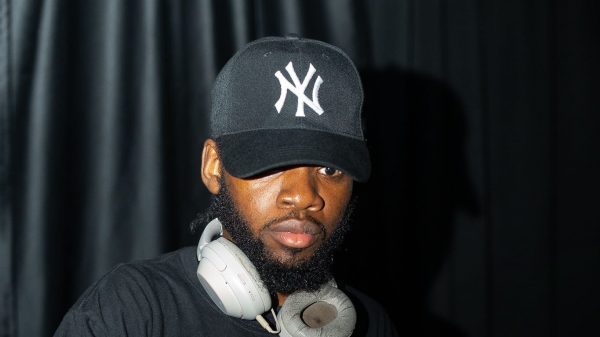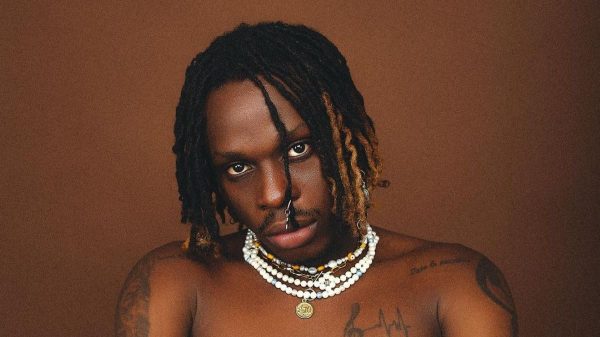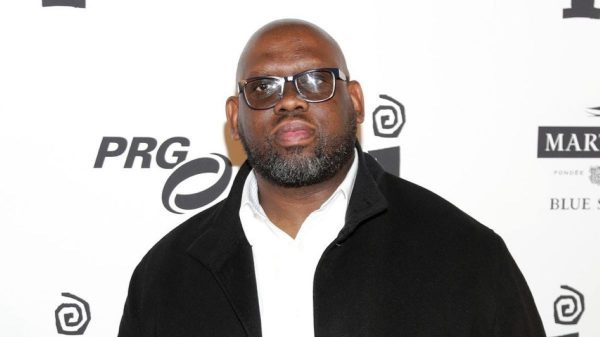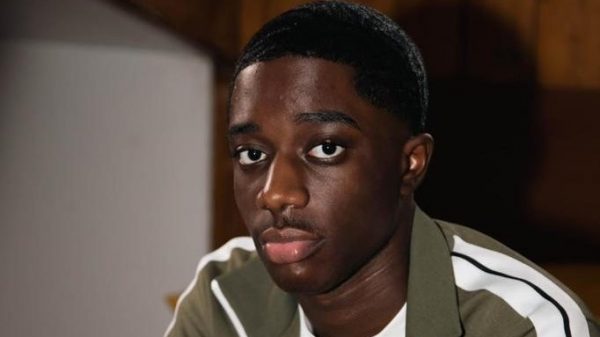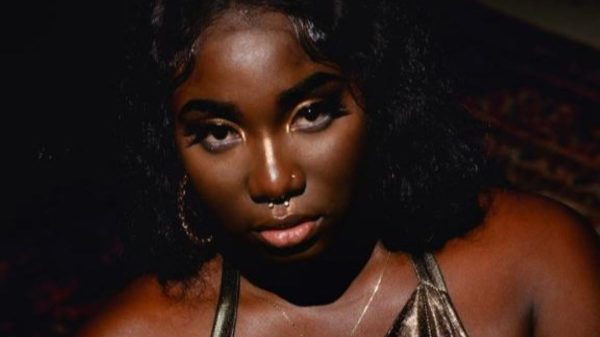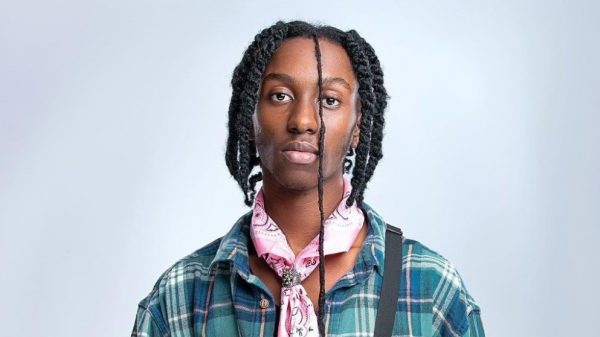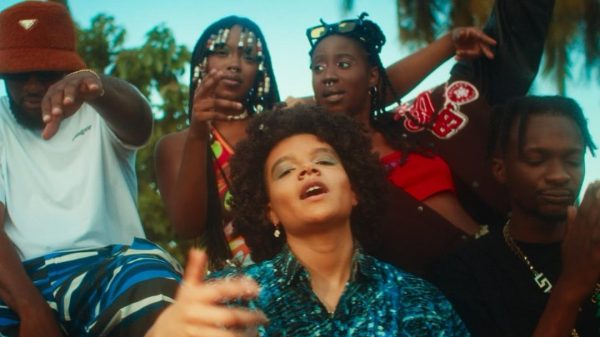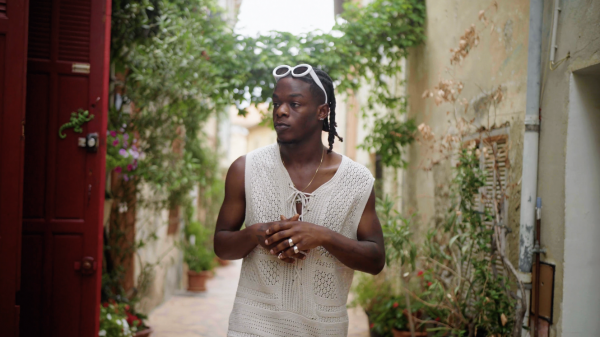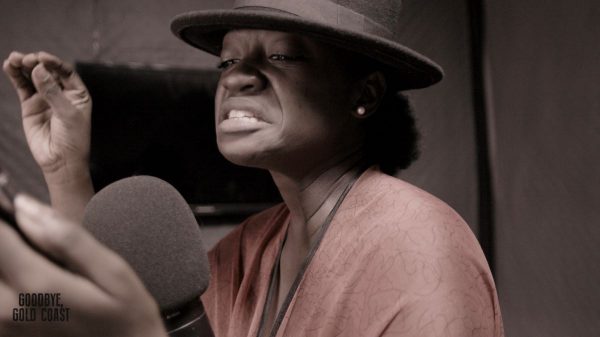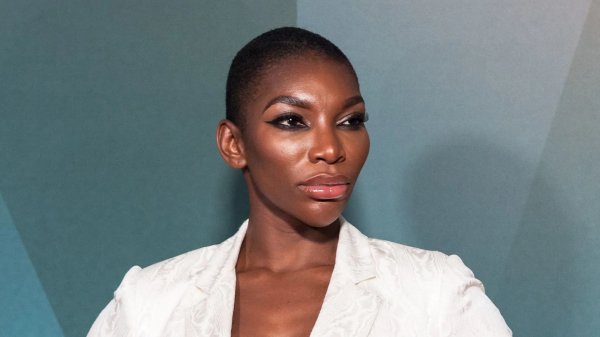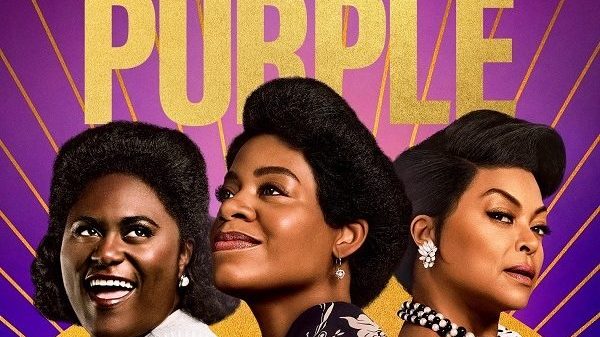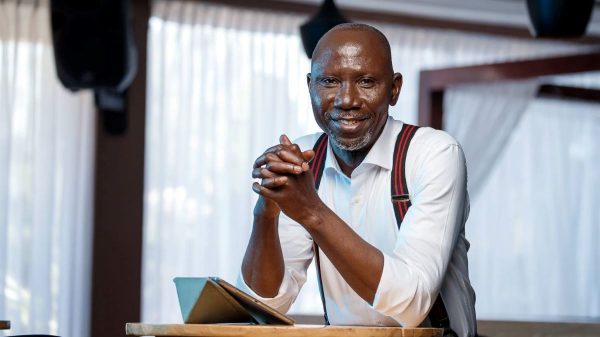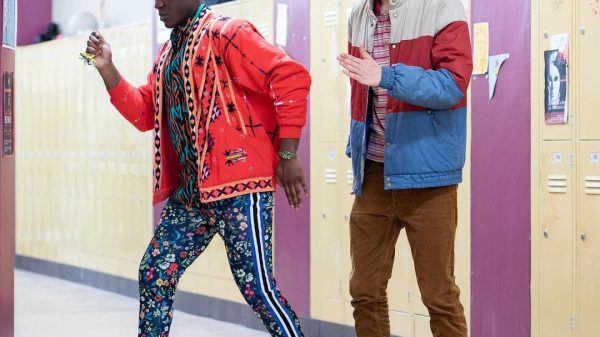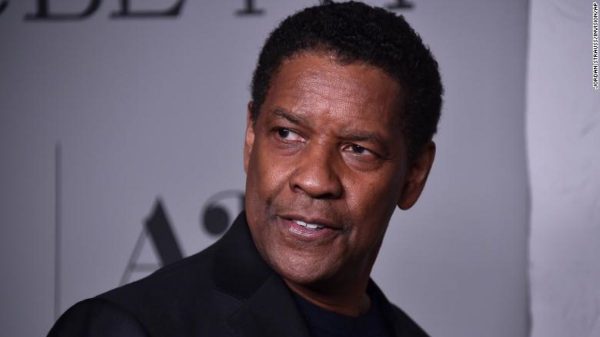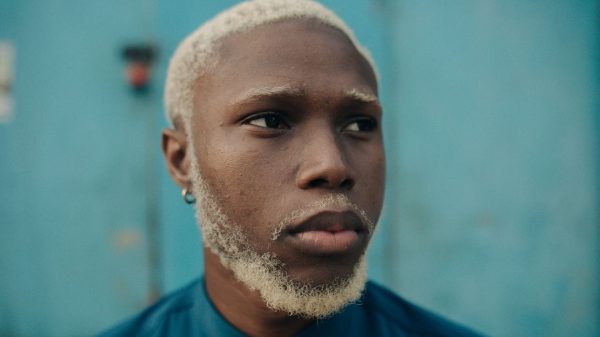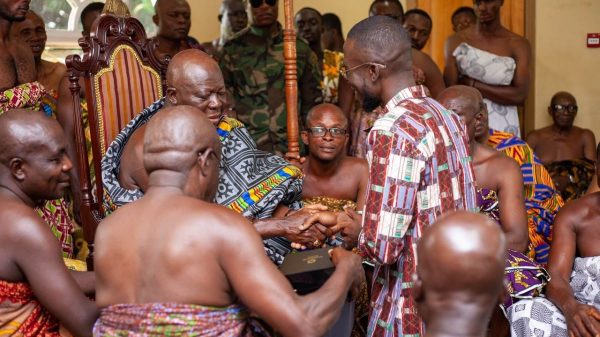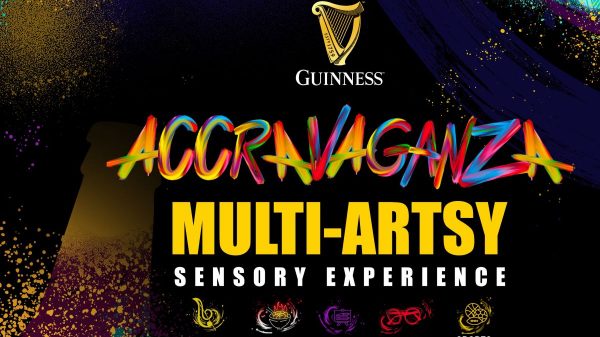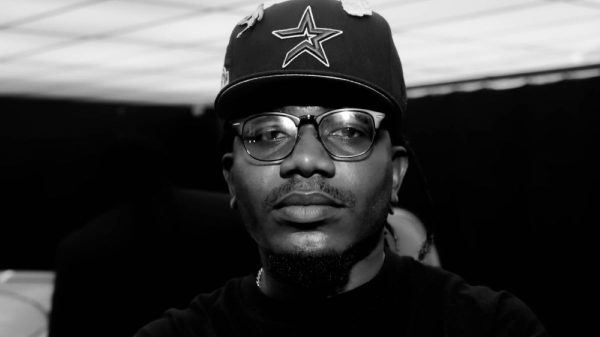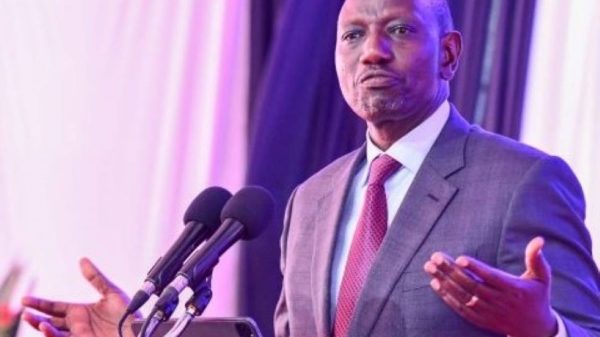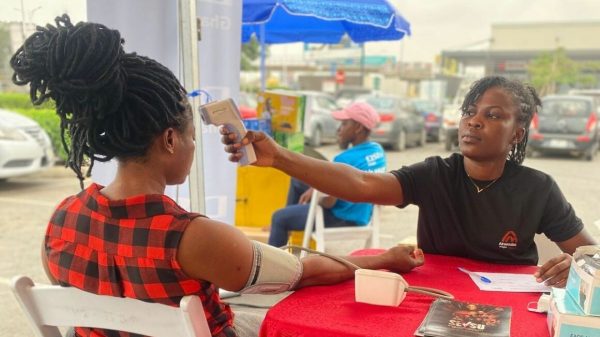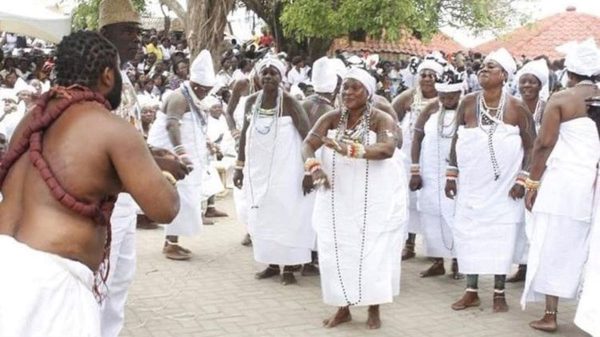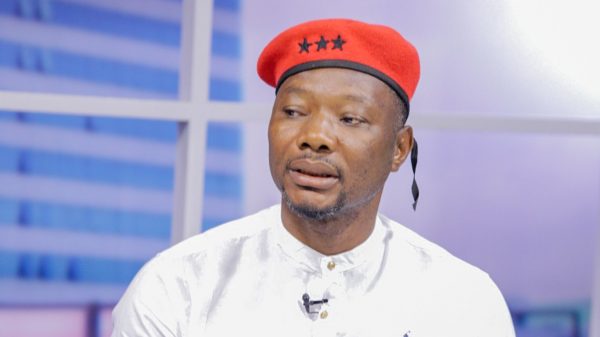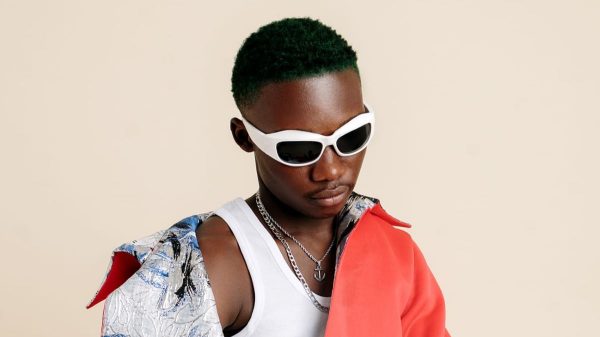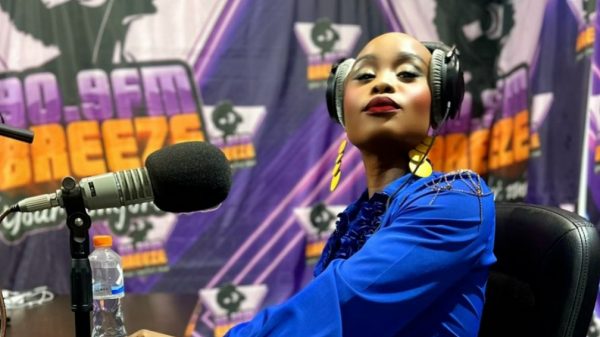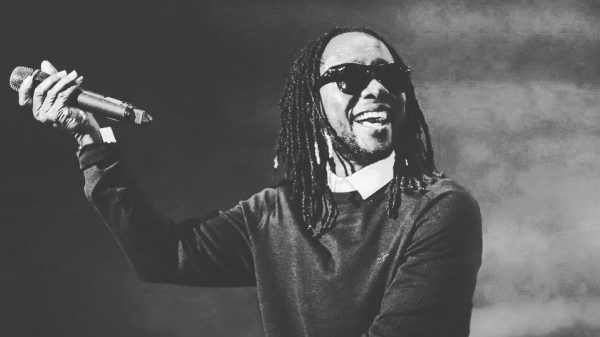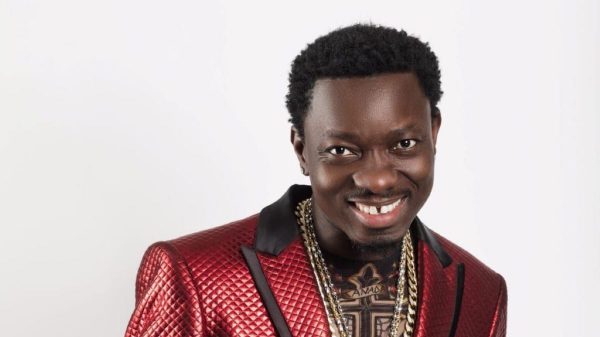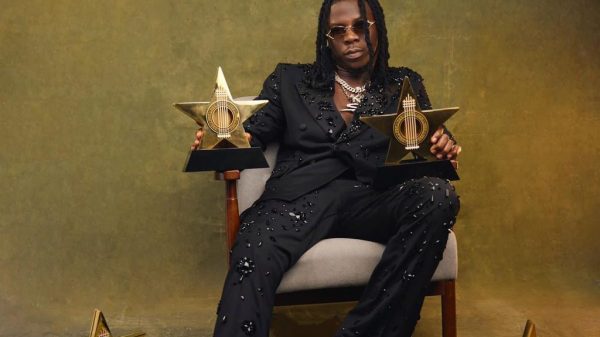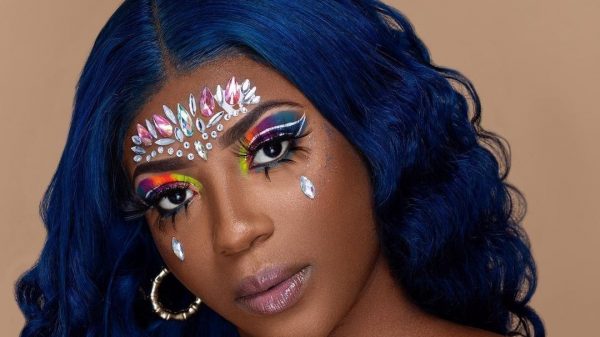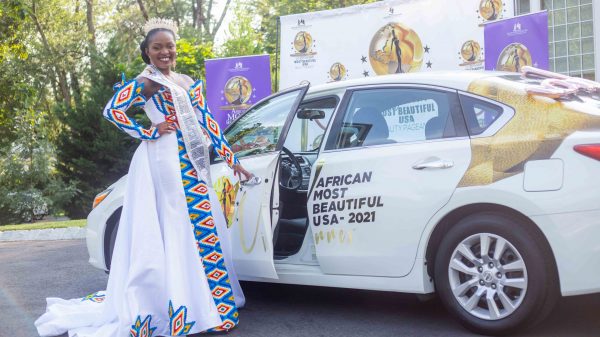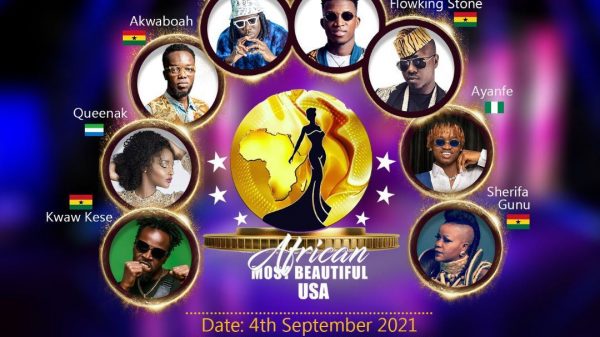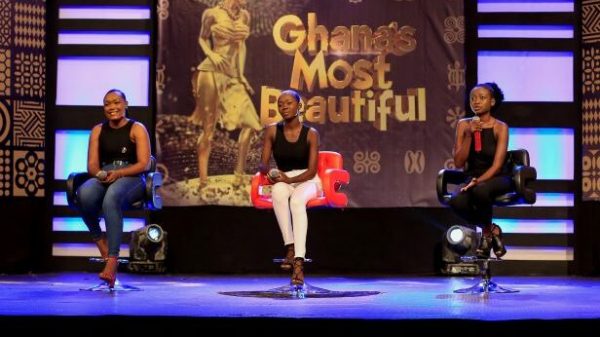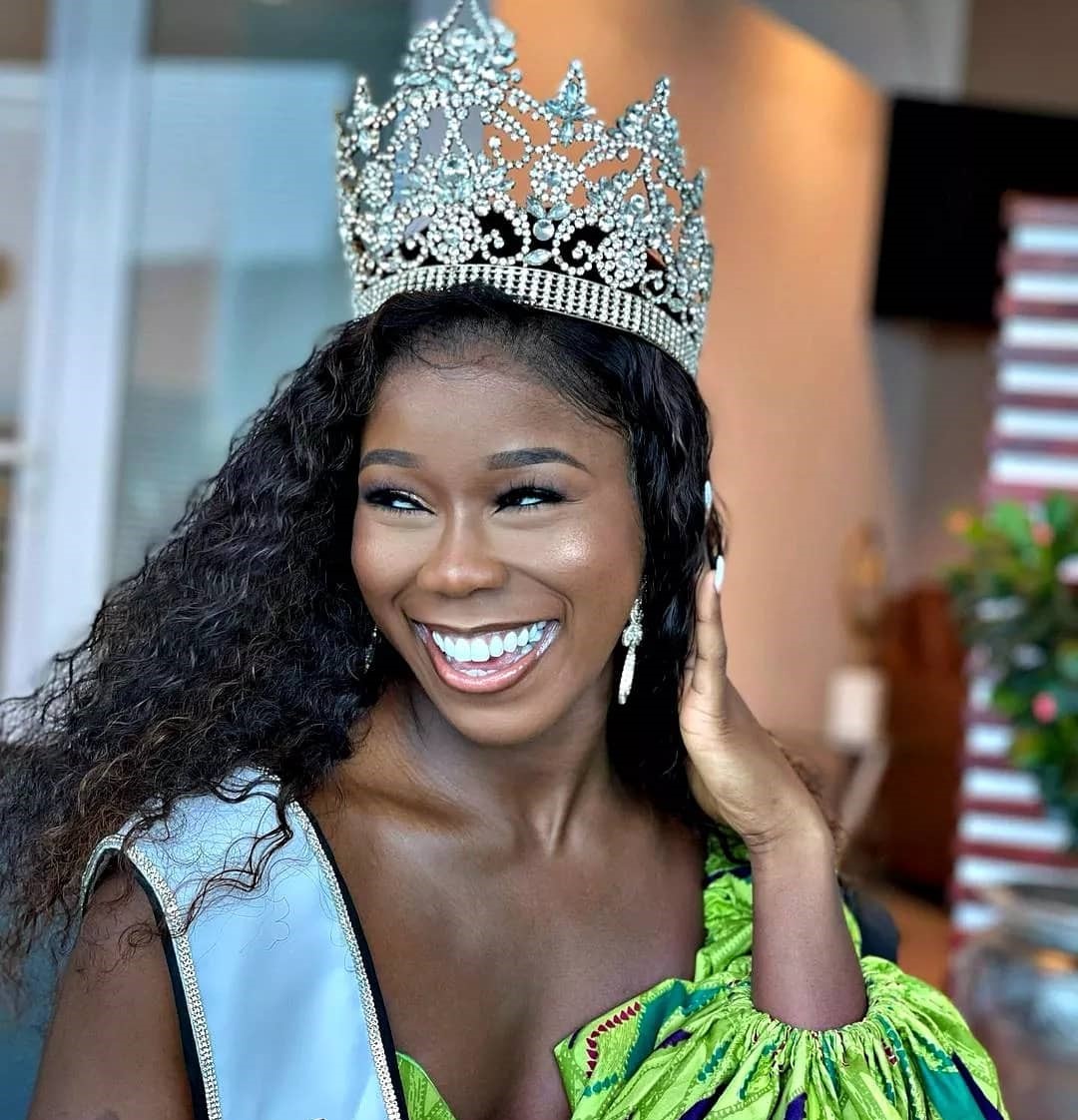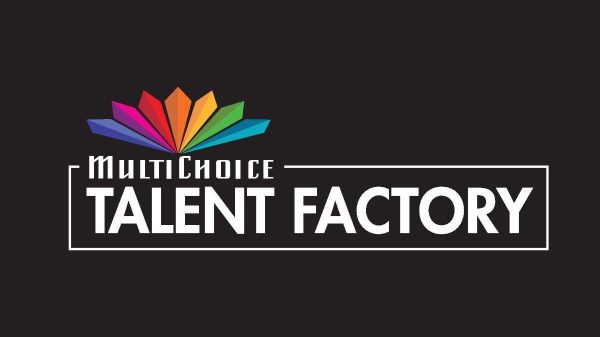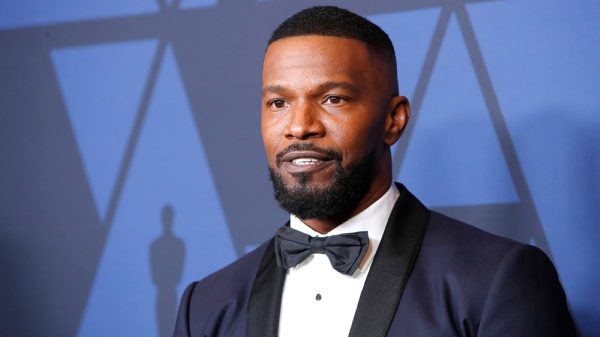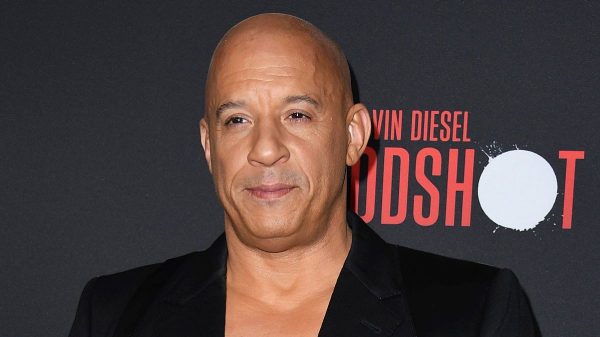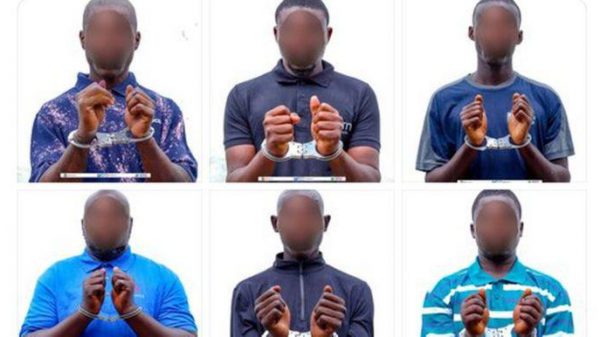In an Abelenkpe-bound Uber cab, rapper Kofi Mole who, due to his bleached dreadlocks and silvery braces, evokes a young Lil Wayne, holds his smartphone to his ear, mumbling half-finished melody over dance-ready instrumentation pouring from the phone’s speaker. Covering his upper body is a Calvin Klein polo shirt, his lower body clothed in tight black jeans ripped at the knees. For footwear, he has selected black and white Vans sneakers. Watching him from my spot next to him in the backseat of the speeding little car, I nod at his method (eyes closed, hands slapping imaginary objects), which is apparently common with musicians. Also in the vehicle is his road manager, also a dreadlocked dark man trading by the alias Dat Boy GH.
Mole is cut from hip-hop’s cloth, and commands mammoth young fandom usually collected under the social movement called “GroundUp Chale.” His mainstream ascendance came via the Kwesi Arthur—assisted “Mensah,” a galvanizing 2018 outliers’ anthem. Other auditory performances, including his lyrical fineness on “Bibii Ba,” a Sarkodie-curated assemblage of emerging rhymesters, was further argument for his demand to not be overlooked as incoming hip-hop Ali.
And yet, Mole is also the man behind “Don’t Be Late,” a track many considered “off-brand” Produced by Kobby Jay and taken from his freshly-published Aposor Love EP, that record is an aching number of unanswered love that quickly became an unquestionable staple. It is where our conversation begins when we arrive at his Abelenkpe location, a warehouse that also lodges his personal recording studio.
“Ebe real-life story,” he begins,” resorting to his preferred Pidgin English as he collapses into a leather couch, “but the beat be hip-hop,” he says, referring to the song’s kick sequence. Dat Boy slumps unto the couch too, and in seconds, is fast asleep from exhaustion.
On his choice of subject and articulation medium for “Don’t Be Late,” the soft-spoken rapper christened Edward Kofi Agyemang Amoah explains—his voice strained from a long day of media rounds, that when he received the beat, he was was indeed experiencing emotional yearning of an amorous nature. “Then I dey want make people get the story well, that be why I put am for singing inside. If you dey sing with melodies, people dey barb am quick.”
It is all the detail he is willing to surrender, and I have no intention of pushing it. I, therefore, promptly steer the conversation away from akoma sentiments, so a more bellicose picking: the phenomenon of street, for which his fans have oiled him the role of ambassador. Our near-hour conversation orbits this conception that enjoys such a glorified personality among a wide section of the country’s youth.
Appropriated from western urban culture, the term may broadly refer to credibility that attends hustling by ANY MEANS NECESSARY. In rap music everywhere, it appears that one shall only be rewarded with success and fame if one can demonstrate that he has been through the mill known as the street.
In an Abelenkpe-bound Uber cab, rapper Kofi Mole who, due to his bleached dreadlocks and silvery braces, evokes a young Lil Wayne, holds his smartphone to his ear, mumbling half-finished melody over dance-ready instrumentation pouring from the phone’s speaker. Covering his upper body is a Calvin Klein polo shirt, his lower body clothed in tight black jeans ripped at the knees. For footwear, he has selected black and white Vans sneakers. Watching him from my spot next to him in the backseat of the speeding little car, I nod at his method (eyes closed, hands slapping imaginary objects), which is apparently common with musicians. Also in the vehicle is his road manager, also a dreadlocked dark man trading by the alias Dat Boy GH.
Mole is cut from hip-hop’s cloth, and commands mammoth young fandom usually collected under the social movement called “GroundUp Chale.” His mainstream ascendance came via the Kwesi Arthur—assisted “Mensah,” a galvanizing 2018 outliers’ anthem. Other auditory performances, including his lyrical fineness on “Bibii Ba,” a Sarkodie-curated assemblage of emerging rhymesters, was further argument for his demand to not be overlooked as incoming hip-hop Ali.
And yet, Mole is also the man behind “Don’t Be Late,” a track many considered “off-brand” Produced by Kobby Jay and taken from his freshly-published Aposor Love EP, that record is an aching number of unanswered love that quickly became an unquestionable staple. It is where our conversation begins when we arrive at his Abelenkpe location, a warehouse that also lodges his personal recording studio.
“Ebe real-life story,” he begins,” resorting to his preferred Pidgin English as he collapses into a leather couch, “but the beat be hip-hop,” he says, referring to the song’s kick sequence. Dat Boy slumps unto the couch too, and in seconds, is fast asleep from exhaustion.
On his choice of subject and articulation medium for “Don’t Be Late,” the soft-spoken rapper christened Edward Kofi Agyemang Amoah explains—his voice strained from a long day of media rounds, that when he received the beat, he was was indeed experiencing emotional yearning of an amorous nature. “Then I dey want make people get the story well, that be why I put am for singing inside. If you dey sing with melodies, people dey barb am quick.”
It is all the detail he is willing to surrender, and I have no intention of pushing it. I, therefore, promptly steer the conversation away from akoma sentiments, so a more bellicose picking: the phenomenon of street, for which his fans have oiled him the role of ambassador. Our near-hour conversation orbits this conception that enjoys such a glorified personality among a wide section of the country’s youth.
Appropriated from western urban culture, the term may broadly refer to credibility that attends hustling by ANY MEANS NECESSARY. In rap music everywhere, it appears that one shall only be rewarded with success and fame if one can demonstrate that he has been through the mill known as the street.
Young Mole, who also responds to the sobriquet “Aposor Gangster,” after a tight-gripping forest dweller, begins his response by disabusing misconceptions that the term has suffered for years. “Eno be anything huhuuhu biaa,” he assures, smiling slightly. “If you talk say street: ebi somebody who dey hustle on ihn own to make a living. You still dey link up with your parents and things but you no dey depend on them…you still dey fit go to town go work then make money, take care of yourself, get things wey your parents not fit afford give you.”
“Street”—the version he subscribes to, at least—does not involve violence. It’s about love and brotherhood: “holding each other down,” and peace, not “gidigidi.”
Also, the concept, per the lecture Mole generously doles out to me, exists everywhere—not just the fabled impoverished suburbs of Nima, or Russia, or Sukura. Even in the privileged blocks of East Legon, “street” is fiercely represented. A chuckle accompanies this last opinion. Some people, he notes, are simply drawn to the street life they have observed from afar; drawn to the grass-to-grace narrative that street life typifies. Street represents ambition and an unflinching commitment to that aim. Say a person’s dream car is a Jeep Wrangler, he must cater to that dream with utmost dedication till it is realized. Why? The street is one’s oyster; home to boundless entrepreneurial opportunities.
Mole also offers perspective on “hustle, (with which “street” are never mutually exclusive and can even operate interchangeably). It is a way of earning a living, he says, “…doing something wey go fetch you money—that be hustle. Wey nobody go fit live without hustle—unless your people get the money put down give you…ihn sef, if you no hustle the money go fini then things, so hustle deɛ ebe life requirement everybody for hustle.”
Hailing from Kumasi in Ghana’s Ashanti Region, Mole is alumnus of the Armed Forces Senior High Technical School for his secondary education. While in Level 300, reading Psychology at the University of Ghana, Mole deferred his course to concentrate fully on his music career, (a decision his father didn’t take kindly to). He insists, though, that hustling can happen alongside school. “You fit dey the street and dey go school alongside.”
On the hustle field, Mole’s credibility is intact, he’ll have you know. He’s “paid his dues.” As he says this, one gets the sense that hailing from a modest home, and having dealt in second-hand clothing at Kantamanto since 2007 to support himself, coupled with now being the source of succour for his compatriots who are still navigating a life bereft of sufficient options has something to do with it. More importantly, the rapper recognizes his current clout on the streets as a result of his current vocation, hence his being particular about his public conduct and utterances.
“I no dey talk to people one-on-one, I dey talk to people through my music. Music be very powerful thing, so I be very careful of every lyric I put out, so I go bring positive impact for people demma lives inside, so my words deɛ I be very careful.
This does not present any weight he did not envisage, he tells me. Rather, in a way, it is a dream come true: “E be something I dream of, say I go come get that platform wey if I talk, I get majority of people wey dey listen to me. I dey deal with am cool.”
Contrary to the strategy of many of his peers, Mole published a ten-track mixtape right out of the gate. His reason: one’s total essence cannot be conveyed in a single song. It can only be achieved with a complete folder comprising the artist’s varying creative prongs. Spread the News, as the body of work is titled, embodies this abundantly. Moreover, the street boy that he is, Mole wanted people to testify to his hard work. He wanted to send a direct message:
“We be that guys wey, if we get chance for the industry, we go fit drop albums and things. We not just come.”
As far as his career is concerned, Mole comes prepared. Throughout his journey, he has imbibed the stories of achievers, constantly reading about Osei Kwame Despite as well as Jay Z. He also names Nas, Lil Wayne, and Sarkodie (who habitually single-handedly sell out arenas) as influences. Mole sees himself eventually elevated to the stratosphere of the aforementioned—who reside at the apex of the apex. It is why, if today, a thousand people chant back his songs at functions, he’s buoyed by the confidence that consistency will secure him twice that number in a year, and tenfold in subsequent years, till he can headline his own show like his idols. It is only at this point when global brands like Coca Cola and Nike are on his heels for endorsement that he will wholeheartedly accept the adjective of celebrity. “If you be human being wey u dey do something, you for move on, you for get that feeling…that high spirit. If today I drop song wey two hundred people spy in a month, tomorrow I go make sure say five hundred go watch in a month. If today I take one 3Music Award (he’s current holder of the Next Rated Act prize), I go make sure say next year, I go take like 3 at least. So e dey. Whatever you dey do biaa nu, everybody for get that feeling say he for go higher.”
Mole holds the avid belief that if one truly desires something, no obstacle should be enough to discourage him. After all, people talk. When he embarked on his current path, detractors said: “Mole this thing, shorn!”
He paid no mind to them, and is reaping from that decision.
“We realize we listen to people keep; people dey tame we too much, so from that time wey I see say no, I no go be tamable again, because people just dey talk out of fear.”
We return briefly to his “Bibii Ba” appearance, via which we tackle the primacy of lyricism. Part of the reason sixteen bars glistened most on that joint, one would wager, is that, unlike a number of his colleagues on the record, he did not obsess about proving his aptitude with the fast-paced rap style. Rather, he ensured vivid elocution of his spiel, making it easy to completely chew on his punchlines: meat and bone. An additional technique comprising clever punning and practical wisdoms guaranteed that his submission—in its entirety—was the most impactful.
Lyricism is a prerequisite of true hip-hop, emphasizes Mole, as are a unique style, and philosophy. If you have all these sorted, “eno go be tough give you,” observes Mole, who somehow remains reticent about the suggestion that his “Bibii Ba” performance is what truly courted him mainstream notice. He places it a spot below “Mensah.” Mole’s first-ever recording with Arthur, “Mensah” was created without a premeditated concept. One evening, they both happened to be in the studio together. Producer KaySo randomly played the beat to them. Both rappers connected instantly. The result of that chemistry is the song.
Where he comes from, there are “No Gentlemen Allowed.” It’s what both his clique and imprint run by. Like “street,” this expression too bears a definition quite different from what you think. He expatiates thus: In Ghana, when the term “gentleman” is mentioned, the image it conjures up is an educated suit-and-tie—wearing person. However, the way the system is set up, not everyone will realistically have access to higher education. For people who are tossed aside by the educational system, but who still nurture desire of breaking the poverty cycles they come from, there are other respectable ways of making a living, and classrooms should never get in the way of one’s quest to succeed. “This movement be just to encourage people say, make them not look down on demma selves like the society dey do. Make them comot demma eye then do demma tin, because success go fit happen for anywhere. People dey work on the street, then later, they employ university graduates.
No gentlemen? No problem, then. Mole and his circle have no qualms proving that they can be achievers nonetheless.
Unavoidable in the arc of a street disciple enjoying appreciable success, there will come a time when Mole will be accused of “using and dumping” the streets when he actualizes, a time when people would say “you dawg the street.” What would be Mole’s antidote for this?
It’s quite simple, really. It’s like the analogy he cited earlier in our sit down.
“I be that guy wey I get good heart for the less privileged people,” he says. As far as he’s concerned, that will never change. If today, he’s offering food to a hundred destitute people, that number will double next year, and so on, “just say e go catch some time I no go fit come myself. And if you dey understand life, you go know say Mole still get heart, but the people wey not dey understand life go talk say Mole dawg the street.”
In the end, this much is true: You can take the man from the street, but good luck draining the streets from the DNA of an act like Mole, who clutches to it like an “aposor.”
“Nobody go fit separate the street from me,” the rapper’s eyes twinkle assuredly. Thus, our conversation comes to a close.
In the brief time that he has practised music professionally, he has mounted high-profile stages and collaborated with sought-after colleagues including Sarkodie, B4bonah, DopeNation, Qwamina MP, Medikal, Shaker, and Kwesi Arthur. He is due to publish Mr Amoah, another body of work in coming months.
Get Aposor Lover on SPOTIFY and BOOMPLAY
(Source: enewsgh.com)


